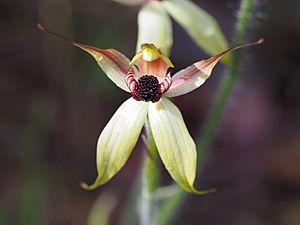Leaping spider orchid facts for kids
Quick facts for kids Leaping spider orchid |
|
|---|---|
 |
|
| Caladenia macrostylis growing near Boyup Brook | |
| Scientific classification |
|
| Kingdom: | Plantae |
| Clade: | Tracheophytes |
| Clade: | Angiosperms |
| Clade: | Monocots |
| Order: | Asparagales |
| Family: | Orchidaceae |
| Subfamily: | Orchidoideae |
| Tribe: | Diurideae |
| Genus: | Caladenia |
| Species: |
C. macrostylis
|
| Binomial name | |
| Caladenia macrostylis |
|
| Script error: The function "autoWithCaption" does not exist. | |
| Synonyms | |
|
|
Script error: No such module "Check for conflicting parameters".
The Caladenia macrostylis, commonly called the leaping spider orchid, is a special type of orchid. It grows only in the south-west part of Western Australia. This means it is endemic to that area.
This orchid has a single, hairy leaf. It can have up to three unique flowers. These flowers are pale greenish-yellow and red. They have a special part called a labellum. In the center of the labellum, there is a cluster of deep purplish calli. Calli are small, raised bumps or glands.
Contents
What the Leaping Spider Orchid Looks Like
The leaping spider orchid is a terrestrial plant. This means it grows in the ground. It is also a perennial plant, so it lives for more than two years. It is a deciduous herb, which means its soft stems and leaves die back at certain times of the year. It grows from an underground tuber, which is like a small storage root.
Leaf and Stem Details
The orchid has one upright, hairy leaf. This leaf is about 12 to 16 centimeters (5 to 6 inches) long. It is about 6 to 10 millimeters (0.2 to 0.4 inches) wide. The flowers grow on a stalk that is about 16 to 25 centimeters (6 to 10 inches) tall. There can be up to three flowers on each stalk.
Flower Features
The flowers are about 4 to 6 centimeters (1.6 to 2.4 inches) long. They are about 3 to 6 centimeters (1.2 to 2.4 inches) wide. The sepals and petals are parts of the flower that look like petals. They have dark, club-shaped tips. These tips are called glandular tips and are about 2 to 4 millimeters (0.08 to 0.16 inches) long.
Sepals and Petals
The dorsal sepal is the one at the top. It curves forward over the column, which is the central part of the flower. This sepal is about 2.5 to 3.5 centimeters (1 to 1.4 inches) long. It is about 3 to 4 millimeters (0.12 to 0.16 inches) wide. The lateral sepals spread forward and downward. They are also about 2.5 to 3.5 centimeters (1 to 1.4 inches) long. They are a bit wider, about 4 to 5 millimeters (0.16 to 0.2 inches) wide. The petals spread upwards. They are about 2.5 to 3 centimeters (1 to 1.2 inches) long and 3 to 5 millimeters (0.12 to 0.2 inches) wide.
The Labellum
The labellum is a special lip-like petal. It is about 10 to 13 millimeters (0.4 to 0.5 inches) long. It is about 10 to 11 millimeters (0.4 to 0.43 inches) wide. The labellum is yellowish with deep purplish-red lines. Its edges are curled under. They have small, crowded, blunt teeth. The very tip of the labellum is also curled under. In the center of the labellum, there is a thick band of blackish calli. These calli are up to 2.5 millimeters (0.1 inches) long.
When it Flowers
The leaping spider orchid usually flowers from August to early November.
How it was Named
The Caladenia macrostylis was first officially described in 1842. This means it was given its scientific name and details were written down. The botanist Robert Fitzgerald described it. His description was published in a scientific journal called Nuytsia.
Where it Lives
The leaping spider orchid is found in Western Australia. It grows in the area between Albany and Bindoon. You can find it in different types of natural areas. These include forests, woodlands, and coastal scrub. These areas are part of what scientists call biogeographic regions.
Conservation Status
The Western Australian Government Department of Parks and Wildlife has looked at the leaping spider orchid. They have classified it as "not threatened." This means it is not currently in danger of disappearing.
See also
 In Spanish: Caladenia macrostylis para niños
In Spanish: Caladenia macrostylis para niños
Images for kids



